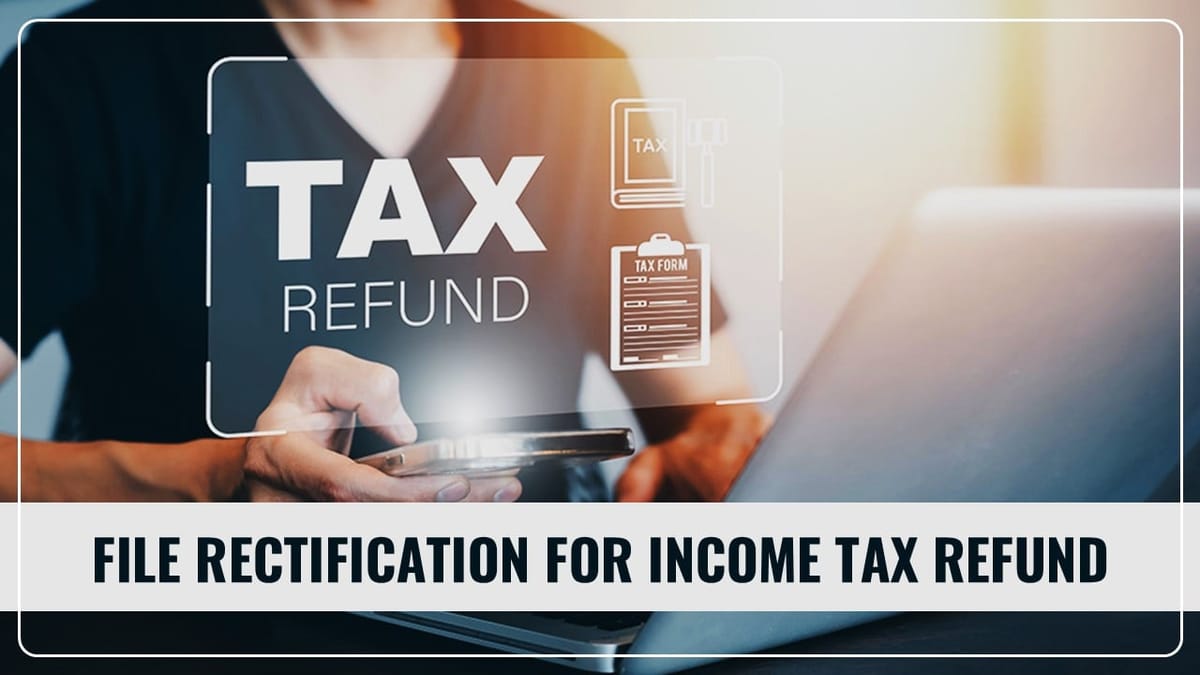Once an ITR has been completed by the tax department, tax refunds are issued within four to five weeks.
Reetu | Aug 12, 2024 |

Not happy with your Income Tax Refund: File Rectification
When you successfully file your income tax return (ITR), the countdown to successful processing begins, and this is the time most taxpayers eagerly await. This is because, once an ITR has been completed by the tax department, tax refunds are issued within four to five weeks.
An intimation under section 143 (1) is sent and forwarded to your email address informing you that the ITR you filed has been processed. You can also monitor the status of your ITR on the e-filing site dashboard.
This notice is issued under Section 143(1) and contains information about the computation of your tax liability and refund. According to Ramakrishnan Srinivasan, former chief commissioner of income tax, if the income tax return is correct, the tax department may proceed with processing the ITR and the amount of refund requested.
“Once the ITR is processed, the department will continue with issuing the intimation about such processing of ITR,” according to him.
If you got a section 143(1) notice from the tax department advising you of the amount of tax refund owed to you, carefully review the computation used by the tax department. If you believe the tax department’s calculation is incorrect and you should receive a larger refund, you may file a Section 154 rectification request.
It is stated on the income tax website as of August 8, 2024, “If there is an error in the record, an Intimation issued under section 143(1), or an order granted by the CPC under section 154, a request for rectification can be submitted through the e-filing portal. A rectification request can only be made for returns that have already been processed by CPC. You can file a rectification request if CPC processes your income tax return incorrectly. Only mistakes that are clear from the record are evaluated for correction. Please do not use rectification requests for any other errors on your part that can be remedied with a revised return. You cannot file a correction request beyond four years from the end of the financial year in which the notification under Section 143(1) was issued. There is no requirement to e-verify rectification requests.”
According to the tax department’s website, you can make three sorts of rectification requests through the e-filing portal:
As per a chartered accountant, you can file a section 154 rectification request if you believe the tax refund amount listed in the notification you received is incorrect.
When an error occurs in an order (or Intimation) passed by the centralised processing centre (CPC) or income tax office, the CPC or income tax office can correct the error. Rectification may be done at the taxpayer’s request or Suo Moto by the CPC or income tax office. For example, if the CPC regarded a lower TDS amount in the Intimation it issued than the taxpayer’s TDS amount on Form 26AS, he can request for rectification and have the Intimation rectified. As a result, the tax demand may decrease or the refund may increase.
The intimation under Section 143(1) reveals the total tax refund payable to you, including interest. However, if the information you provided in the ITR does not match the department’s records, you may receive a notice.
Srinivasan said, “In the event of a mismatch in tax credit claimed, the department uses the data without notifying the taxpayers. However, the order (section 143(1) intimation) issued by the department following the processing of the return will show the tax credit requested by the taxpayer and the tax credit approved by the department. If the taxpayer has a grievance, he or she may file a petition under Section 154 to have it resolved.”
According to Srinivasan, taxpayers may be notified under section 143(1)(a) for any of the following reasons:
In case of any Doubt regarding Membership you can mail us at [email protected]
Join Studycafe's WhatsApp Group or Telegram Channel for Latest Updates on Government Job, Sarkari Naukri, Private Jobs, Income Tax, GST, Companies Act, Judgements and CA, CS, ICWA, and MUCH MORE!"